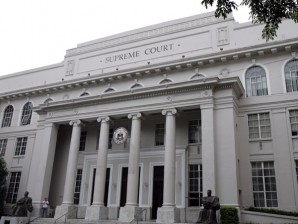MANILA, Philippines — It appears that the recent legal battle between Manila Mayor Alfredo Lim and the city council over the hiring of casual employees is a case of history repeating itself.
The Supreme Court already issued a decision on the very same issue in a petition by former Manila Mayor Mel Lopez in 1991: that the vice mayor could hire employees into the City Hall.
More than a thousand non-regular employees of the City Hall were laid off when Mayor Lim issued an executive order in March reducing the casual personnel by 30 percent in response to a Commission on Audit 2011 finding that the city exceeded the budget limit for salaries.
Judge Daniel Villanueva of the Manila Regional Trial Court Branch 49 declared the executive order invalid in June and ordered the city treasurer and budget officer to disburse the salaries of the dismissed employees. A city hall employee said, however, that they have not received their salaries.
Villanueva earlier said that the law has always been clear “that the appointment of employees or personnel in the city council … is well within the province of the vice mayor.”
In a seminar for village officials at the University of Makati on Saturday, Lim took a swipe at the city council for not following the Local Government Code of 1991 (Republic Act No. 7160), which, he said, assigned to the mayor the exclusive power to appoint city hall employees, even those working in the staff of city councilors, who could only recommend hiring to the mayor.
“The fact that it had been the practice that the vice mayor had been the one making such appointments over the years does not make it legal,” Lim was quoted in a statement. “Righteousness should always prevail over illegal acts.”
In the Supreme Court 1991 case, petitioners asked whether the power to appoint city council employees rested with the vice mayor under the Charter of the City of Manila (RA 409, a special law for Manila) or with the mayor as stipulated in the Local Government Code (RA 5185, a general law for local governments).
The Supreme Court ruled that regardless of date of passage, a special law should prevail over a general law. It added that giving mayors the authority to appoint employees of the city was meant to indicate the devolution of power from the President to the local government and not meant to deprive the city council of its appointing power stipulated in the law.
Thus, the high tribunal dismissed former Mayor Lopez’s petition against the Civil Service Commission, then Vice Mayor Danilo Lacuña and the City Council of Manila.
